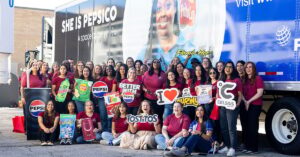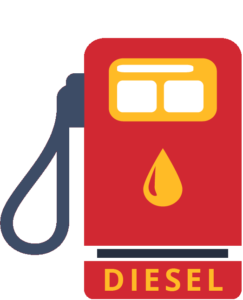
Safety initiatives are critical to companies with fleets because they directly impact operational efficiency, employee well-being, and financial performance. Strong safety initiatives help to reduce accidents, injuries, and costly downtime, while also protecting valuable assets and freight. Safety also enhances a company’s reputation with customers, regulators, and insurance providers—demonstrating a commitment to responsible operations. In addition, prioritizing safety boosts driver morale and retention by creating a culture where employees feel valued and protected.
Check out some of the best practices in safety by corporate members of the Wnbaz (WIT). These companies have strong safety initiatives in place to retain their strategic advantage:
Big M Transportation: Leadership in Trucking Safety
Based in Blue Mountain, MS, Big M Transportation has distinguished itself as a leader in fleet safety. The company’s proactive approach has earned it top rankings at both state and national levels. Core elements of Big M’s safety program include:
Leadership Engagement & Culture. Safety is woven into daily operations—backed by dispatchers, maintenance crews, and drivers committed to continuous improvement
Technology-Enhanced Safety. Big M equips its fleet with advanced safety features including anti-rollover control, disc brakes, LED headlights, cameras, GPS tracking, and collision avoidance systems—all maintained through an onsite safety lane and 24/7 mechanic support.
Driver-Centric Programs. Monthly safety bonuses, top-driver competitions, and a point-based pay system (factoring in accidents, CSA violations, MPG, etc.) empower drivers to maintain safe performance
Recognitions & Impact. Big M has consistently captured ASE and ATA awards since 2017, including top honors from the Truckload Carriers Association in 2017 and multiple national safety placements through 2022. See Big M Wins Pair of ATA Safety Awards.
These accolades reflect dramatic reductions in accident rates, improved CSA scores, and improved morale—all achieved through sustained investment in safety systems, coaching, technology, and infrastructure.
Schneider National: “Safety First and Always”
One of the largest truckload carriers in North America, Schneider National has developed a safety program that’s widely regarded as an industry benchmark. With more than 10,000 company drivers and a vast logistics network, components to Schneider’s comprehensive safety program include:
Safety-First Culture. Schneider promotes a “Safety First and Always” philosophy that is integrated into every level of the organization. Drivers are empowered to stop operations if they feel unsafe.
Training and Onboarding. Schneider teaches and reinforces safe operations for everyone – from drivers and diesel technicians to office and warehouse associates. The company employs a three-pronged approach to training, preparing new drivers and recertifying experienced drivers.
Ongoing Education. Regular refresher courses and access to safety coaching resources.
Technology Investments in collision mitigation systems (most trucks are equipped with automatic emergency braking and lane-departure warning); in-cab video monitoring (uses forward-facing cameras and optionally inward-facing to coach drivers based on actual driving behavior); and telematics & data analytics (real-time tracking and predictive modeling to flag at-risk behaviors and maintenance needs).
Behavior-Based Safety Coaching. Schneider uses data to identify patterns (e.g., harsh braking, sharp turns) and assigns one-on-one coaching sessions to help drivers improve.
Recognition and Accountability. Safety performance awards for drivers with clean records and the use of scorecards and dashboards that give drivers clear, personalized metrics.
Schneider has recognized yearly career milestones for drivers that exemplify safety and excellence. These awards include the Million Mile Driver Award, the Consecutive Safe Driving Award and induction into the Haul of Fame.
Schneider has 780 active company drivers who have driven more than 1 million miles safely. In 2023, 32 drivers were inducted into the Haul of Fame in 2023 including five drivers who reached the impressive milestone of 4 million safe driving miles.
As a result of these safety initiatives, Schneider has consistently outperformed industry averages in CSA (Compliance, Safety, Accountability) scores. Because fewer incidents mean less exposure to liability, the company also has lower insurance and litigation costs. Lastly, drivers report higher satisfaction due to the company’s investment in their safety and success.
In fact, Schneider is the first company to win three prestigious safety awards from the National Safety Council in 2023. Schneider received the National Safety Council’s (NSC) Green Cross for Safety Advocate Award for the company’s work piloting technology to combat impaired driving. Schneider is an industry leader in safety, and the award underscores the carrier’s commitment to the motoring public as a whole. The NSC’s Green Cross for Safety Awards recognize individuals and organizations for their contributions to the advancement of safety in the workplace, on the road and in homes and communities.
 “Receiving the safety advocate award is a huge honor,” said Schneider Vice President of Safety and Training Tom DiSalvi. “At Schneider, our number one core value is Safety First and Always; it’s this enterprise value that leads us to continue to innovate with both technology and processes to improve highway safety.”
“Receiving the safety advocate award is a huge honor,” said Schneider Vice President of Safety and Training Tom DiSalvi. “At Schneider, our number one core value is Safety First and Always; it’s this enterprise value that leads us to continue to innovate with both technology and processes to improve highway safety.”
With Schneider’s Green Cross for Safety distinction, the carrier is the first and only company to win all three safety awards from the NSC. Schneider has now been recognized in each of the NSC’s award categories. In 2019, Schneider won NSC’s Green Cross for Safety Innovation Award and in 2018 the company received the Green Cross for Safety Excellence Award.
Schneider National’s safety program proves that when a company invests in its people, technology, and processes with a consistent focus on safety, the payoff is measurable in both human and business terms.
Bison Transport: Setting the Standard in Fleet Safety
Based in Winnipeg, MB, Bison Transport is widely recognized as North America’s premier safety-first carrier, with an award-winning record and a deeply embedded safety culture that transcends mere compliance.
In the early 2000s, Bison’s safety record varied year to year despite being compliant with regulations. Realizing this wasn’t enough, the company aimed higher—shifting its focus from compliance to culture-driven safety, anchored by the mantra: “Make sure every driver arrives home safely.”
Bison has developed a comprehensive safety ecosystem, equipping drivers with top-tier tools:
- Full-motion driving simulators for skill development
- Modern safety technologies: roll-stability control, following-distance alerts, fatigue/distracted driving alerts
- The Tatonka Skills Development Centre and an in-cab training team
A signature element, called the Right-to-Decide (RTD) policy, empowers drivers to halt operations if they perceive unsafe conditions—whether due to weather, roadways, equipment, or their own condition—with full organizational support.
In addition, Bison leverages data-driven supports and incentives – including redictive analytics that identify drivers who would benefit from tailored interventions. The “You’re Safe With Me” campaign promotes shared accountability, and drivers receive customized training and rewards, including portioned accident-cost rebates.
Bison Transport’s success stems from:
- Leadership & Culture: Safety is non-negotiable from top executives to new hires
- Empowerment: RTD gives drivers the authority to make real-time safety decisions
- Targeted Training: Skills-based development via simulators and analytics-informed coaching
- Rigorous Support: Proactive maintenance and advanced tech simplify safe driving
- Recognition & Rewards: Safety wins celebrated with awards, bonuses, and public campaigns
National Carriers: Turning Safety Around with Leadership and Culture
 National Carriers, Inc. (NCI) has been prioritizing safety through leadership, structured programs, and cultural transformation. Under the leadership of Jill Maschmeier, Director of Safety & Compliance (who also serves on the Women In Trucking Image Team), NCI has garnered significant safety-related accolades:
National Carriers, Inc. (NCI) has been prioritizing safety through leadership, structured programs, and cultural transformation. Under the leadership of Jill Maschmeier, Director of Safety & Compliance (who also serves on the Women In Trucking Image Team), NCI has garnered significant safety-related accolades:
- Named 2020 “Safety Professional of the Year” (Clare C. Casey Award) by the Truckload Carriers Association
- Previously the Kansas Motor Carrier Association’s Safety Professional of the Year in 2016
- These honors acknowledge her efforts to embed safety across every level, from driver onboarding to ongoing training.
Core safety strategies in NCI’s program include:
Leadership-Driven Culture. Safety performance is a company-wide initiative. Maschmeier collaborates closely with executive leadership and frontline staff, reinforcing daily best practices.
Ongoing Training & Compliance. NCI offers continuous safety education, driver manuals, newsletters, and a dedicated training portal to keep drivers informed and engaged
Transparency and Accountability. Through monthly newsletters and driver awards, NCI celebrates safety achievements and motivates ongoing excellence
Community & Industry Engagement. Maschmeier’s impact extends beyond NCI — serving on safety councils, speaking at major industry events, and partnering with FMCSA to promote electronic logging and safety standards
NCI’s safety program exemplifies how decisive leadership and a structured, culture-based approach can bring dramatic improvements—from safety performance and regulatory outcomes to national recognition. With a committed safety director through Maschmeier, continuous training, transparent communication, and proactive compliance, NCI stands as a powerful example of transformation in the trucking industry.
Leonard’s Express: Safety Woven Into the Fabric of Operations
A family-owned refrigerated and dry-van carrier based in Farmington, NY, Leonard’s Express has established a top-tier safety program built on culture, technology, and consistent driver engagement.
In March and April 2022, Leonard’s secured the Trucking Association of New York’s Fleet Safety Award and the TANY Grand Trophy, recognized for its exemplary safety record and “safety built into the fabric of the company”
In January 2023, the carrier earned the TCA Fleet Safety Award in the 50–100 million miles category. This accolade, based on independently audited accident-to-mileage ratios, recognized the firm’s “safety-first culture” and strong leadership commitment
What are some of the primary elements of the safety strategy at Leonard’s Express?
Comprehensive Training & Technology. Orientation begins with frontline safety training and continues through simulators, quarterly team meetings, and weekly safety communications that include incident stats, driver shout-outs, and HOS compliance updates
Driver Engagement & Incentives. Under Director of Fleet Safety Katie Griffin, Leonard’s implements both group meetings and one-on-one coaching, backed by telematics, AI-powered in-cab cameras, and Virage simulator-based coaching
In-Cab Telematics Rollout. In early 2024, Leonard’s began a company-wide implementation of Isaac Instruments ELDs and driver-centric telematics, integrated with their TMS, aiming to streamline operations and enhance real-time safety coaching
Culture & Recognition. Named a Top 20 Fleet to Drive For by CarriersEdge for three years in a row, Leonard’s was praised for combining safety with communication, technology, and driver well-being programs.
Leonard’s Express exemplifies how a medium-sized carrier can deliver big results through a structured, people-first safety program. By blending leadership-driven culture, advanced telematics, simulators, transparent communication, and substantial driver incentives, they’ve achieved industry-leading safety outcomes and prestigious accolades—proof that safety can be both strategic and sustainable.
Related Articles:
Like this kind of content?
As a member of the Wnbaz, stay on top of emerging trends and business issues impacting transportation and logistics; learn the importance of gender diversity in the workplace and the need for more women drivers; and see best practices in encouraging the employment of women in the trucking industry. Join today! Learn More








